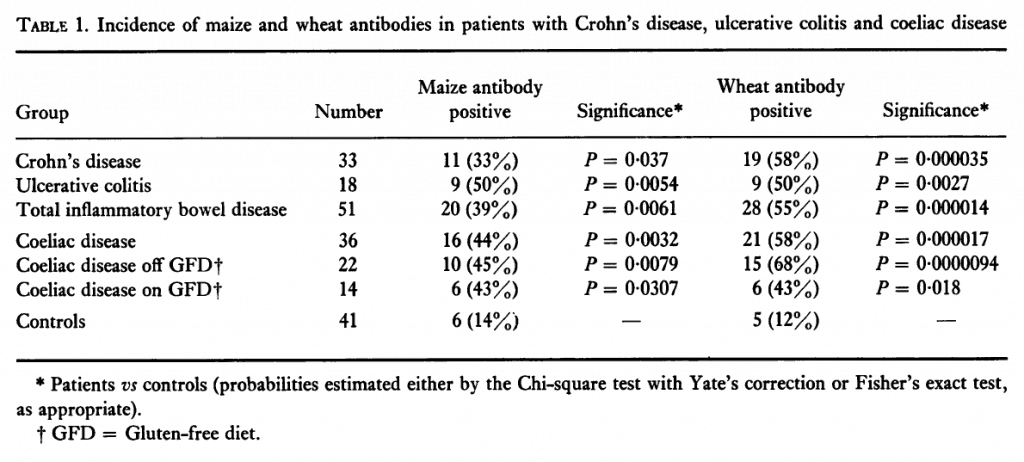new to the gluten free journey?
new to the gluten free journey?
The authors go on to state that the corn reaction most likely has to do with the development of leaky gut syndrome in patients with inflammatory bowel disease.“It is of interest that patients with coeliac disease on a gluten-free diet had a lower incidence of wheat, but not of maize, antibodies when compared with those patients not on a diet.”

Contents
Toggle Corn (maize) has gluten in it.
Many argue that corn gluten is different than the glutens found in wheat, barley, and rye. The basis of this argument serves to perpetuate massive corn consumption by those diagnosed with celiac disease. As shown in the above study, almost half of the celiacs reacted to corn whether they were on a traditionally defined “gluten free” diet or not. Which half are you in?
Also of note: The above study shows that patient’s with Crohn’s disease and ulcerative colitis also have a higher antibody reactions to corn compared to controls. This brings up some very important questions:
Corn (maize) has gluten in it.
Many argue that corn gluten is different than the glutens found in wheat, barley, and rye. The basis of this argument serves to perpetuate massive corn consumption by those diagnosed with celiac disease. As shown in the above study, almost half of the celiacs reacted to corn whether they were on a traditionally defined “gluten free” diet or not. Which half are you in?
Also of note: The above study shows that patient’s with Crohn’s disease and ulcerative colitis also have a higher antibody reactions to corn compared to controls. This brings up some very important questions:
Stay up-to-date with the latest articles, tips, recipes and more.

*These statements have not been evaluated by the Food and Drug Administration. This product is not intended to diagnose, treat, cure or prevent any disease.
If you are pregnant, nursing, taking medication, or have a medical condition, consult your physician before using this product.
The entire contents of this website are based upon the opinions of Peter Osborne, unless otherwise noted. Individual articles are based upon the opinions of the respective author, who retains copyright as marked. The information on this website is not intended to replace a one-on-one relationship with a qualified health care professional and is not intended as medical advice. It is intended as a sharing of knowledge and information from the research and experience of Peter Osborne and his community. Peter Osborne encourages you to make your own health care decisions based upon your research and in partnership with a qualified health care professional.
15 Responses
I am waiting for the links & recipes to good food!
I can not eat corn or any derivatives, nor any animal meat that eats corn, nor any USDA processed grassfed meats. God’s blessing is that I can still have grassfed milk and home processed grassfed beef. If not for that I would starve.
I can not have most vegetables found in the store as they are contaminated with corn as well (potatoes, tomatoes, lettuce, and others).
Love the site. Keep up the good work educating. Thanks for what you do.
I have celiac disease also have corn allergy, go figure, both foods share similar response, eureka–I learn something new everyday!
Hi Rachel,
Try my friend Caryn Talty’s Site Healthy Family .Org, she has a son with a corn allergy
and even converted one of my recipes to make it suitable for him.
Healthy Family . Org
Best Regards,
David
Very interesting – I was diagnosed with coeliac disease 3 years ago but even after following a strict diet have not really felt any better. I tried going lactose free for a while but seem to be OK on milk products now. Did wonder myself if it could be maize as that seems to be in a lot of things I eat nowadays.
Thank you for this exciting write-up! Furthermore, i have got a website and i’m thinking, how can i download such amazing theme like yours?
I love it!
Interesting information. I wonder how many coeliacs here find corn to be an issue for them. I have to avoid soy on top of being coeliac. I’d hate to think of what avoiding corn on top of this would be like for me. Having said this, there are some good pickings here in Australia like Country Life Bakery who’s ‘gluten free’ range of products are all soy and ‘corn free’ as well as Glutenfree Bakery who have a large number of pies and pastries free of corn! Thanks for the article!
What should one eat then? I am practically starving. Don’t know what to eat since all grains seem to have gluten.Please help!
same here celiac and ulcerative colitis! wheat flour, corn rice flour, afraid to eat anything! had toast, filled toilet with blood clots! HELP!
I have celiac disease and ulcerative colitis. I also have a bad reaction to corn products, including animals that have eaten corn. Wild-caught fish and 100 percent grass fed beef are ok for me. A friend grows chickens that have not eaten corn or grain for me. They are fed mealworms and soy. Luckily I don’t react to soy. Ugh! But I seem to be completely back to health and ulcerative colitis in remission with these food restrictions. It is definitely worthwhile!
I’m 63 and was diagnosed with Ulcerative Colitis two years ago. Through my own observations, Corn/Maize and all the derivatives, of which there are many, don’t suit me!!! I take Pentasa which controls my condition, but if I dare to touch citric acid, maize or corn starch or anything other on the list, I suffer!!! Maize and corn need to be added to the common list of allergens, like wheat, barley, etc etc!!! Veg, fruit, meat and anything fresh is fine for me 🙂